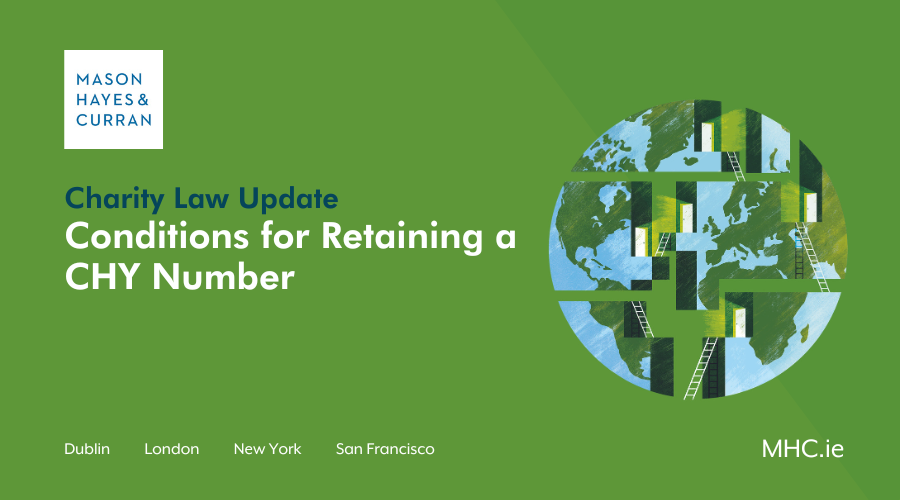Conditions for Retaining a CHY Number

In order to maintain a charitable tax exemption (CHY number) from the Revenue Commissioners, certain conditions must be met. For religious organisations which rely on their CHY number for exemptions from income tax, corporation tax, capital taxes and stamp duty, it is very important that these conditions are understood and adhered to.
As a charity’s donations relief is also predicated on holding a CHY number, compliance with these conditions is important to ensure that charities can continue to avail of the tax benefits of holding a CHY number and the benefits of donations relief.
The conditions of retaining a CHY number include that the organisation must:
- Remain tax compliant
- Maintain its charitable status with the Charities Regulator
- Use all of its income and property for its main charitable purpose only
- Keep proper records and accounts
- Keep audited accounts if the charity’s annual income is over €250,000
- Have a majority of Irish-resident charity trustees, and
- Seek the consent of the Revenue Commissioners to accumulate funds for more than two years
The latter two requirements are ones that might sometimes be overlooked, but are important for all charities, including religious organisations, to be aware of.
Majority of Irish-resident trustees
This condition requires a majority of the organisation’s charity trustees to be resident in the Republic of Ireland. The reference to “residency” is a reference to tax-residency and should not be confused with the nationality of charity trustees.
This can be a difficult requirement to meet, particularly for religious congregations / organisations with a provincial structure stretching across the UK and Ireland, or across Europe. The charity trustees, who are usually the Provincial or Regional Leadership Team, will be chosen by reference to the congregation’s own canonical constitution or other governing document. Typically, these rules will not have given consideration to the tax-residency of those to be chosen to govern the Province / Region.
If an organisation finds itself out of compliance with the requirement to have a majority of Irish-resident trustees, there are a number of options available to it. If possible to appoint a greater number of Irish-resident trustees, this step should be taken. Alternatively, the organisation may need to review its structure, and how its activities in Ireland are governed, to see if it is possible to restructure in a way that aligns with the organisation’s overall governance / hierarchical structure, while meeting the residency requirements for trustees.
Consent to accumulation of funds
If an organisation intends to accumulate funds for more than two years, it must obtain the prior consent of the Charities and Sports Exemptions Unit of the Revenue Commissioners.
There are various reasons why charities, including religious organisations, may wish to accumulate funds for more than two years. It may be intended to carry out a building project, which requires savings to complete. Many religious organisations have looked ahead to the funds that will be required to look after ageing members, and have put aside reserves to plan for the future care and accommodation of those members. These are all good reasons for accumulating funds – but the consent of the Revenue Commissioners must be obtained.
The consent of the Revenue Commissioners to an accumulation of funds can be obtained by writing a letter to the Revenue Commissioners. The letter should set out:
- The reason for the proposed accumulation
- How the quantum of the accumulation has been calculated, and
- How the funds will be used
We recommend that charities keep an eye on this requirement, and also diarise ahead to seek the Revenue Commissioners’ consent if it appears likely that they will need to accumulate funds for more than two years.
Conclusion
Charities holding a CHY number should ensure that, in addition to meeting the requirements that are imposed by the Charities Regulator, they also comply with the conditions of retaining a CHY number. This will ensure the continued tax benefits of the charity’s CHY number and donations relief.
People also ask
How do you know if a charity is tax exempt? |
A charity that has been granted a charitable tax exemption (CHY number) by the Revenue Commissioners receives exemptions from certain taxes. There is no longer a public list of organisations holding a CHY number. Therefore, a request must be made to the Revenue Commissioners to confirm if a charity is tax exempt. |
What exemptions are available for charities? |
A charitable tax exemption grants a charity an exemption from the following taxes:
|
Can you claim tax back on charity donations Ireland? |
Charities which hold donations relief can claim a benefit, which allows them to claim the amount of tax paid on the donation if an individual donates over €250 in a year to the charity. If a corporate donates an amount over €250 in a year to a charity holding donations relief, it is the corporate which can obtain the tax benefit. |
For more information and expert advice, please contact a member of our Charity and Not-for-Profit team.
The content of this article is provided for information purposes only and does not constitute legal or other advice.
Share this:



